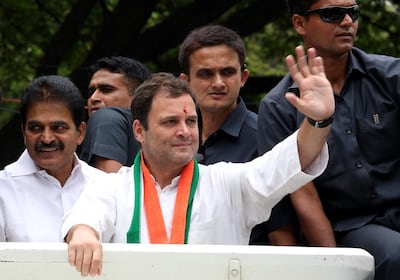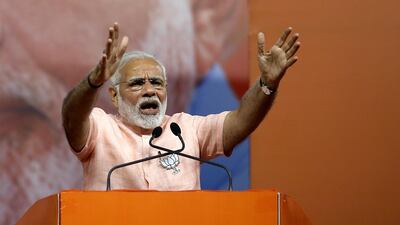With India’s national elections just a year away, Prime Minister Narendra Modi’s magical grip on the electorate will come under spotlight tomorrow when the southern state of Karnataka goes to the polls to elect its regional assembly.
It is a high-stakes battle for Mr Modi’s Bharatiya Janata Party and the opposition Congress Party, with the outcome likely to set the tone for the parliamentary elections next summer.
After a series of electoral setbacks, Congress is hoping retain power in the regional assembly, although opinion polls predict a split vote. The third-ranked Janata Dal Secular Party is projected to hold the bargaining power.
The fact that both Mr Modi and Congress president Rahul Gandhi camped for days in Karnataka in pitched electoral campaigning suggests that both parties consider the vote a dress rehearsal for parliamentary elections next year.

The contest between Mr Modi and his principal challenger Mr Gandhi reached a new high during electioneering with both taking potshots at each other, pushing regional and development issues to the back burner.
The one-upmanship took a dramatic turn in Bangalore earlier this week after Mr Gandhi expressed his prime ministerial ambitions openly, which invited caustic rebuke from Mr Modi, who likened him to a ‘sarfira’ and ‘dabang’, meaning a person who does not believe in discipline and who believes only in muscle power.
Mr Modi has attacked Mr Gandhi – a son of the Nehru–Gandhi political dynasty –for his privilege in the past, but it became more vitriolic after Mr Gandhi said he was ready for the top job. “The manner in which he declared himself as the next prime minister in 2019 is indicative of his cloud nine arrogance," Mr Modi said at a public rally in Bangarpet in Kolar district on Wednesday. "That's the arrogance of a dynast. That exposes the kind of internal democracy that is practised in the Congress.”
Mr Modi also sought to drive a wedge between Congress and its coalition partners over Mr Gandhi’s comment. Congress has just 44 members in the Lok Sabha and is the ruling party in only three states, including Karnataka. To nurse any hopes of returning to power in the centre, it will have to keep all its present allies intact and win even more.
“The dynast does not respect coalition dharma, nor has any faith in those seniors," Mr Modi said. "Will the people of the country ever accept such an immature dynast for prime ministerial post?"
____________
Read more
Hindu nationalists disrupt Muslim prayers in India
India braced for further sand storms
India: top court concerned about Taj Mahal colour change
____________
The increasing personal attacks follow Congress’s positive performance in Gujarat earlier this year, and are seen as an acknowledgement by the prime minister of the rising stature of his principal rival. Mr Gandhi has also been vocal about the Modi government’s failure to deliver on its election promises, including the creation of 20 million jobs every year.
“The barbs, the ridicule and the effort to portray him [Rahul Gandhi] as a buffoon shows that Mr Modi now accepts that Mr Gandhi is a force to reckon with” said Prof Muzaffar Assadi, a political scientist and former professor of political science at the University of Mysore. “Mr Gandhi is making Mr Modi lose sleep. He is engaging Modi like nobody else has.”
A positive result for the Congress Party in the Karnataka elections would end the party’s “hibernation” and take the country away from BJP-centric political discourse. “I expect Congress to get a simple majority," Mr Assadi said. "If that happens it will act as a catalyst for change. The political discourse will have to be changed from BJP as a dominant force in the Indian politics to it as one of several forces. The dream of BJP to use Karnataka as a gateway to the south India will also get shattered.”
Reacting to Mr Gandhi’s overt prime ministerial ambitions, Mr Assadi said, it was a move to make people “accept his presence”.
“It’s a new debate he has thrown up. It’s a strategy to accept his presence. Rahul positions himself as an alternative. The 2019 elections are going to be a battle between two ideas. An idea represented by Modi of a modern India, developed India, a crony capitalist India ,as opposed to an idea of India that is inclusive and secular. Mr Gandhi speaks language of the people, the farmers, the minorities, the backwards and Dalits.”
Mr Gandhi yesterday refused responded to Mr Modi's barbs, suggesting the “personal attacks” against him were “diversionary tactics” that show the quality of his rival.
The results of the Karnataka elections will be out on Tuesday.

